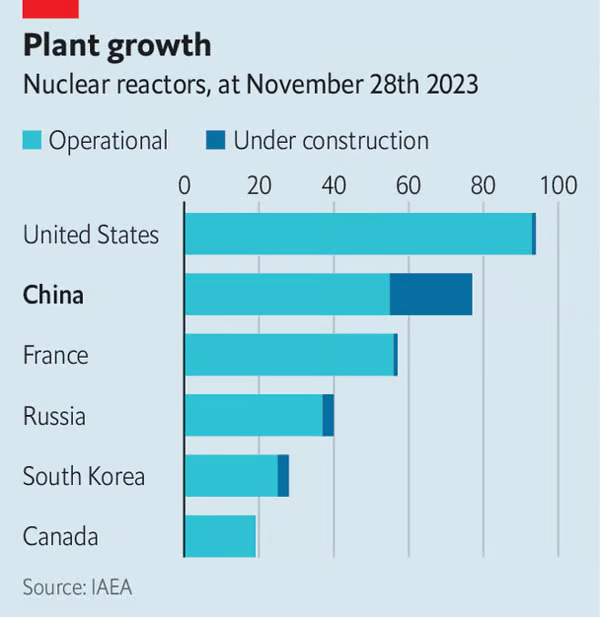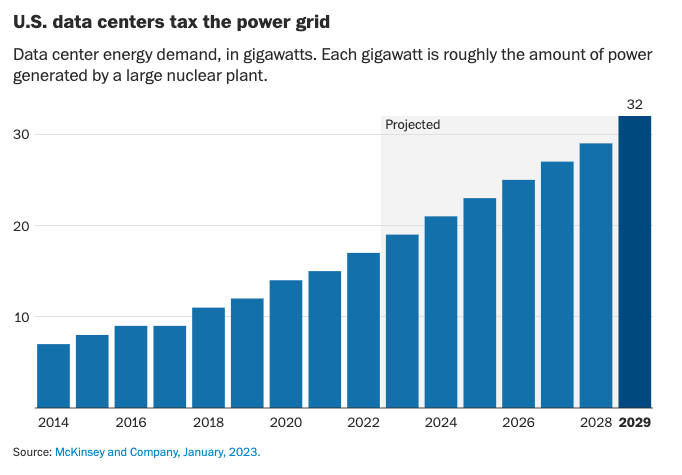Our Investment in The Nuclear Company
Building fleet-scale nuclear power on time and on budget
The U.S. and other Western countries largely stopped building new nuclear reactors in the 1980s. The resulting decades-long decline of nuclear power in the U.S. has led to a decay of the industry’s workforce, which has undergone a loss of vital professions such as skilled welders, pipefitters, and electricians, and risks ceding American leadership in this critical sector needed to produce carbon-free energy. Despite America’s history as a nuclear energy juggernaut and nuclear’s lower operational costs compared to other forms of generation, the cost of constructing nuclear power plants has increased by about 33% while the cost of new solar generation has fallen 90%. All this comes amid the Biden Administration's goal of the U.S. achieving net zero energy by 2035, surging energy demand resulting from mass electrification and the advent of artificial intelligence, and the rapid deployment of nuclear reactors in China.
While many view America’s preeminent legacy in nuclear power in decline, the nation remains the largest generator of nuclear energy, representing 30% of the world’s output. With 94 reactors in operation today — down from a peak of 112 in 1990 — the U.S. derives approximately 19% of its domestic electricity needs from nuclear fission. The opportunity for growth and expansion of American nuclear production is as vast as it is necessary. The country that capitalizes on this historic moment will set the tone for the future of nuclear energy worldwide.

The Nuclear Company aims to restore America’s leadership in nuclear power by building fleets of nuclear power plants on time and on budget. With a focus on America’s heartland, the company envisions employing methods that drive down the expense of nuclear power plant construction. By taking an end-to-end approach toward power plant development, The Nuclear Company envisions reducing the cost of new nuclear deployment similar to how SpaceX has lowered the cost of space travel. MCJ is excited to announce its investment in The Nuclear Company, which is founded by an amazing team of seasoned entrepreneurs and operators that include Jonathan Webb, Patrick Maloney, and Kiran Bhatraju.
What is The Nuclear Company?
The Nuclear Company is revolutionizing nuclear power plant development by addressing delays and budget overruns that have plagued the industry. Unlike traditional approaches that rely on multiple siloed subcontractors, The Nuclear Company adopts a comprehensive oversight strategy. By managing the entire process from start to finish, the company focuses on the 88% of costs associated with infrastructure and operations that exist outside of the reactor and steam system. This allows for effective cost-containment. Additionally, The Nuclear Company takes direct control over supply chain management, sourcing, workforce coordination, and financing required for constructing power plant fleets. Through this approach, The Nuclear Company aims to achieve the same efficiencies found in state-sponsored models without the bureaucratic and heavy-handed deficiencies.
Why Did We Invest?
There are many aspects to The Nuclear Company that drove our excitement and reason for investing.
Compelling Founder-Market Fit
Foremost, The Nuclear Company’s three founders and the management team they’ve assembled are the basis of why we invested. The company’s CEO & Co-Founder, Jonathan Webb, previously founded AppHarvest, which built large indoor mechanized farms in Appalachia. In that role, he demonstrated his ability as a roll-up-your-sleeves leader and someone who prides himself on being at the construction site to ensure projects are built to spec. Prior to founding AppHarvest, he worked with the U.S. Department of Defense on a massive solar project to help achieve a White House goal of ensuring the military’s hundreds of installations receive 20 percent of their electricity from renewable sources. As a native son of Kentucky, he has strong ties to both community and political leaders in the region. Serving as Chairman, Patrick Maloney is an inveterate entrepreneur, having built and sold multiple companies in the energy space. Most recently, he founded Inspire, a clean energy technology company that provides renewable electricity and energy management services to consumers and small businesses; Inspire was acquired by Shell in 2022. The third co-founder, Kiran Bhatraju, is well known as the CEO of Arcadia, which has made a name for itself providing consumers with access to community solar as well as serving as one of the leading utility data platforms. As an investor in Arcadia, MCJ jumped at the opportunity to back Kiran again in this new venture. The founders have assembled an impressive management team, including Ron DeGregorio who has over 40 years in leadership at large energy companies and most notably served as CEO of Net Power and President of Exelon Power, and Juliann Edwards, who has spent decades in leadership roles throughout the nuclear sector and is the Chair of U.S. Women in Nuclear.
Need For Clean Baseload Energy
Energy demand is on the rise, driven by the growing EVs, heat pumps, and other electrical devices and assets being plugged into the grid. In 2023, U.S. energy demand rose 4.7% alone and consumption is expected to increase exponentially over the coming decades. Another major catalyst is the boom in data center construction, spurred by investments in AI. The explosive growth in data center build-out by companies dubbed “hyperscalers” has made the demand for clean baseload power particularly acute. The Nuclear Company plans to partner with energy-hungry tech companies as well as heavy industry in the green steel and hydrogen space, providing them with reliable energy that helps them achieve their decarbonization goals.

A recently announced nuclear-power purchase agreement between Talen Energy and Amazon represents a 50% premium over what nuclear power plants command today in the wholesale market and signals the tailwinds nuclear power plant operators will benefit from as a result of the AI boom.
A Reactor-Agnostic Platform To Scale Nuclear
As MCJ’s first investment in fission, The Nuclear Company offers an appealing opportunity to back a company that can enable current and novel reactor technologies. The company is philosophically agnostic to any specific type of reactor and is open to working with any technology that is safe, economical, and regulatory-approved.
Bi-Partisan Support
While solutions to address climate change often elicit polarizing political sentiment (nuclear is certainly no exception), there has been growing support from both Democrats and Republicans for deploying more nuclear energy. On July 9th, President Biden signed the ADVANCE (Accelerating Deployment of Versatile, Advanced Nuclear for Clean Energy) Act, which garnered an overwhelming majority of congressional support from both sides of the aisle. The law represents shared interest across party lines in restoring America’s leadership in nuclear development by streamlining the approval process at the NRC.
Staging America’s Nuclear Comeback
The United States, once a leader in nuclear development, now faces an industry that has atrophied. However, with the increasing demand for clean energy and the success of nuclear energy development abroad, there is potential for the U.S. to reclaim its former leadership in the sector. The obstacles for developers are primarily related to mobilizing and managing human talent and financial resources, as well as navigating the U.S. regulatory environment. Despite the industry's struggle to adapt to the changing economic and social landscape, the U.S.'s long-standing legacy in nuclear energy gives it a distinct advantage. In light of that history and the dire contemporary need, we are enthusiastic about The Nuclear Company ushering in America’s nuclear comeback.
Additional Resources






Nuclear, despite public opinion historically (now changing), is the safest form of power per unit energy generated. The rise of cheap wind and solar is fantastic, and that coupled with energy storage is a huge part of the solution. That said, we will always need clean base load power. Nuclear ramping up (at the expense of CO2/particulate emitting plants like gas and coal) is a huge win. As others point out below, there are waste management issues to solve, but the right way to think about this is risk per unit powered generated. On that metric, nuclear is by far the safest form of power humanity has ever invented/discovered. That said, nuclear risks intuitively seem scarier than the chronic risks we just accept from fossil fuel plants, e.g. air pollution, asthma and cancer deaths, climate change, etc. Humans did not evolve to properly reason about "unlikely but scary" events, as compared to "likely but less dramatic" ones. For example, why are people who live in landlocked areas more scared of sharks than high blood pressure? I do hope that public opinion is turning here and becoming more based on the actual risks, and that we all work together to find a path forward. The bipartisan support and recent uptick in acceptance for nuclear is very encouraging!. Congrats to you on the investment!
It is past time to stop nuclear entirely and begin the decommissioning process on existing. It can and should be replaced with wind, solar, and water. All much cheaper, cleaner, and more efficient without need for massive backup of gas or other. Enough WWS could be installed to repair the power crisis very quickly: before, in fact, financing for sufficient nuclear, never mind construction, can be arranged.